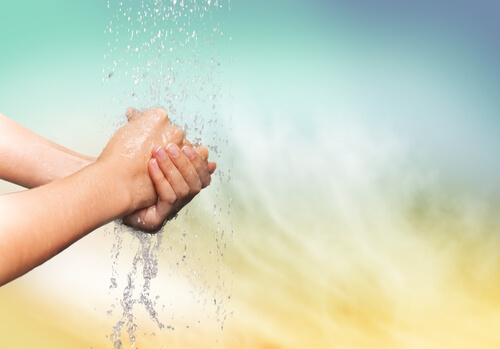Washing Your Hands Won't Clean Your Conscience

According to the Gospel, Pontius Pilate left the sentence that would mark the destiny of Jesus in the hands of the villagers. When he did so, he denied ownership of any responsibility over what happened. Washing his hands distanced him from the consequences of the decision and any involvement in the situation.
The expression “to wash one’s hands” has been passed down through time, and it forms a part of our everyday language. It’s normally used with a negative connotation: “I’m washing my hands,” or in other words, “I deny any involvement in whatever happens. I’m exonerating myself in advance.” As we already know, it’s used especially when someone is aware that there’s a big pressure to choose one specific option out of many.
“I am innocent of this man’s blood!”
-Pontius Pilate-
That’s why it’s so frustrating: washing your hands is an act of cowardice that lets all the weight fall on other people’s shoulders. However, sooner or later people always pay for it. It’s likely that the burden will only be lifted momentarily, since the person’s conscience and behavior is tainted.
It’s easier to avoid responsibilities than consequences
Behind every decision, there is someone who should be held accountable for making it. Otherwise it would be really complicated to make responsible and ethical decisions. This is something we’re all aware of. When we find ourselves in complicated situations, we’re tempted to share the weight of decisions that we don’t want to make.

In these cases, which are common in family or work environments, people avoid making decisions, finding solutions, or facing issues; it takes less effort and it’s easier. But these people forget that, either by action or omission, they’re still involved in the problem and the consequences that end up happening.
In other words, showing disregard for something that’s resting on them doesn’t free anyone from anything, and in fact, they might end up losing sleep over it. The conscience is a valuable judge that evaluates behavior and dictates its own sentences.
“I prefer the testimony of my conscience, to what all mankind may say of me.”
-Cicero-
A scientific experiment
Like the news station ABC reported, studies reveal that washing your hands (literally) after a moment of conflict reduces distress and can create a sense of justification for our actions. The water seems to help with the feeling of guilt and remorse. The University of Michigan did such a study to prove it.
They gave a group of people a set of CDs and had them organize ten of them based on their preferences. Afterwards, they were told that they could keep either the one they had put in fifth position or the one in sixth position. Next, half of the participants washed their hands with soap, and the other half examined a container of soap. When they finished, the two groups had to reorganize the CDs.
The ones who washed their hands kept the initial order of their CDs, while the ones who hadn’t done so put the CD they had chosen to keep in a higher rank and the one that they had discarded towards the end.
The researchers concluded that those who had washed their hands didn’t feel the need to justify the decision that they had made between the two CDs, but the ones who didn’t wash their hands reorganized the CDs because they felt the need to justify their decision. They relocated the one that they had chosen to keep to a much higher position than the one they had discarded.
Washing your hands doesn’t make them clean
Just like in the experiment, the use of water can be found in religious contexts. It’s a symbol of purification of the soul that helps to redeem one’s sins. So it’s likely that Pontius Pilate’s words didn’t only remove him from responsibility, they also reduced his remorse over it.

However, in practice, washing one’s hands doesn’t always make them clean. We’ve all made a mistake that we’ve wanted to disengage ourselves from, even for the simple reason that it was overwhelming. But the truth is that, afterwards, the decision follows us around like a heavy weight that we constantly have to fight with.
“Conscience is the voice of the soul; the passions are the voice of the body.”
-Shakespeare-
Having a guilty conscience is like having a bad friend who is almost impossible to get away from. Morals and ethics show us that we haven’t acted in the right way, and it won’t let us sleep soundly, to the point where we can’t find inner peace. When the conscience is stained, it teaches us to grow with our mistakes, to practice solidarity, and to renew our values.
Main image by Valeri Tsenov
According to the Gospel, Pontius Pilate left the sentence that would mark the destiny of Jesus in the hands of the villagers. When he did so, he denied ownership of any responsibility over what happened. Washing his hands distanced him from the consequences of the decision and any involvement in the situation.
The expression “to wash one’s hands” has been passed down through time, and it forms a part of our everyday language. It’s normally used with a negative connotation: “I’m washing my hands,” or in other words, “I deny any involvement in whatever happens. I’m exonerating myself in advance.” As we already know, it’s used especially when someone is aware that there’s a big pressure to choose one specific option out of many.
“I am innocent of this man’s blood!”
-Pontius Pilate-
That’s why it’s so frustrating: washing your hands is an act of cowardice that lets all the weight fall on other people’s shoulders. However, sooner or later people always pay for it. It’s likely that the burden will only be lifted momentarily, since the person’s conscience and behavior is tainted.
It’s easier to avoid responsibilities than consequences
Behind every decision, there is someone who should be held accountable for making it. Otherwise it would be really complicated to make responsible and ethical decisions. This is something we’re all aware of. When we find ourselves in complicated situations, we’re tempted to share the weight of decisions that we don’t want to make.

In these cases, which are common in family or work environments, people avoid making decisions, finding solutions, or facing issues; it takes less effort and it’s easier. But these people forget that, either by action or omission, they’re still involved in the problem and the consequences that end up happening.
In other words, showing disregard for something that’s resting on them doesn’t free anyone from anything, and in fact, they might end up losing sleep over it. The conscience is a valuable judge that evaluates behavior and dictates its own sentences.
“I prefer the testimony of my conscience, to what all mankind may say of me.”
-Cicero-
A scientific experiment
Like the news station ABC reported, studies reveal that washing your hands (literally) after a moment of conflict reduces distress and can create a sense of justification for our actions. The water seems to help with the feeling of guilt and remorse. The University of Michigan did such a study to prove it.
They gave a group of people a set of CDs and had them organize ten of them based on their preferences. Afterwards, they were told that they could keep either the one they had put in fifth position or the one in sixth position. Next, half of the participants washed their hands with soap, and the other half examined a container of soap. When they finished, the two groups had to reorganize the CDs.
The ones who washed their hands kept the initial order of their CDs, while the ones who hadn’t done so put the CD they had chosen to keep in a higher rank and the one that they had discarded towards the end.
The researchers concluded that those who had washed their hands didn’t feel the need to justify the decision that they had made between the two CDs, but the ones who didn’t wash their hands reorganized the CDs because they felt the need to justify their decision. They relocated the one that they had chosen to keep to a much higher position than the one they had discarded.
Washing your hands doesn’t make them clean
Just like in the experiment, the use of water can be found in religious contexts. It’s a symbol of purification of the soul that helps to redeem one’s sins. So it’s likely that Pontius Pilate’s words didn’t only remove him from responsibility, they also reduced his remorse over it.

However, in practice, washing one’s hands doesn’t always make them clean. We’ve all made a mistake that we’ve wanted to disengage ourselves from, even for the simple reason that it was overwhelming. But the truth is that, afterwards, the decision follows us around like a heavy weight that we constantly have to fight with.
“Conscience is the voice of the soul; the passions are the voice of the body.”
-Shakespeare-
Having a guilty conscience is like having a bad friend who is almost impossible to get away from. Morals and ethics show us that we haven’t acted in the right way, and it won’t let us sleep soundly, to the point where we can’t find inner peace. When the conscience is stained, it teaches us to grow with our mistakes, to practice solidarity, and to renew our values.
Main image by Valeri Tsenov
This text is provided for informational purposes only and does not replace consultation with a professional. If in doubt, consult your specialist.







